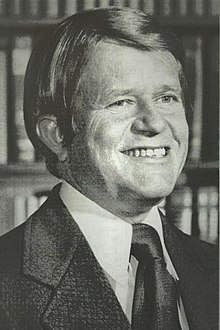Robert Burren Morgan
| Robert Burren Morgan | |
|---|---|
 |
|
|
United States Senator from North Carolina |
|
|
In office January 3, 1975 – January 3, 1981 |
|
| Preceded by | Sam Ervin |
| Succeeded by | John P. East |
| 43rd Attorney General of North Carolina | |
|
In office January 3, 1969 – August 26, 1974 |
|
| Preceded by | T. Wade Bruton |
| Succeeded by | James H. Carson, Jr. |
| Member of the North Carolina Senate | |
|
In office 1955–1969 |
|
| Personal details | |
| Born |
October 5, 1925 Lillington, North Carolina |
| Died | July 16, 2016 (aged 90) Buies Creek, North Carolina |
| Nationality | American |
| Political party | Democratic |
| Religion | Baptist |
Robert Burren Morgan (October 5, 1925 – July 16, 2016) was an American politician. He was a Democratic United States Senator from the state of North Carolina, a position that he filled for a single term from 1975 until 1981.
Born in Lillington, North Carolina, Morgan attended Lillington public schools and later East Carolina College and Wake Forest University School of Law.
Morgan's political career began early when political leaders in his home county of Harnett County, including highly respected Democratic stalwart Veneble Baggett, visited him at the Wake Forest Law School and urged him to run for Clerk of Court. Morgan did so and was elected. After building a reputation in that office, he went into the private practice of law. His skill as a trial lawyer caused his practice to grow, and he soon established a reputation that extended across the state. Personal injury, real property and antitrust law were among his specialties.
He next ran for the North Carolina State Senate and won. He rose to the Senate's highest office, President Pro Tempore, and chaired key committees. He mastered the legislative process, and the experience he obtained in the State Senate served him well when he was later sent to the United States Senate by the voters of North Carolina.
In 1968, Morgan challenged long-time incumbent Attorney General Wade Bruton in the Democratic Party primary, defeated him, and then won the General Election. He served one four-year term and then was re-elected. He served two years of that term and then resigned to run for the U.S. Senate.
Early in his political career, Morgan was considered a conservative supporter of segregation because of his allegiance to his former Wake Forest law professor, conservative politician I. Beverly Lake, Sr., who ran an unsuccessful pro-segregation campaign for governor in 1960 against the progressive supporter of civil rights, Terry Sanford. But later, as an influential state senator, as North Carolina attorney general from 1969 to 1974, and as the successful candidate to succeed Democratic U.S. Senator Sam Ervin, Morgan was considered a moderate.
...
Wikipedia
